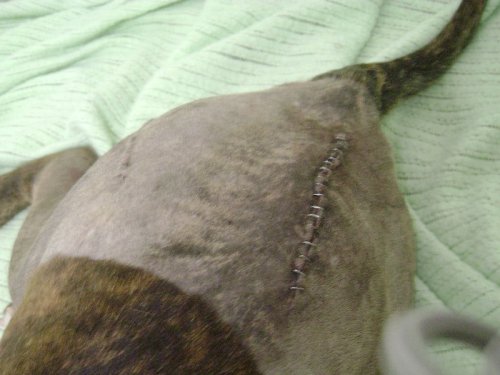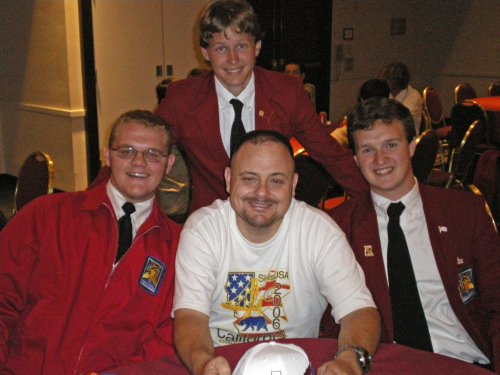LAKEPORT – A local doctor has sued the Lake County Record-Bee for libel, saying an April story incorrectly reported on her medical care of a patient, leading to damage of her professional reputation.
The case was filed in Lake County Superior Court on May 27. No specific damage amounts are listed, and no initial hearing has yet been set. The newspaper must serve a responsive pleading by July 18.
Named in the suit as defendants are the Record-Bee's parent company, MediaNews Group Inc., the fourth largest newspaper company in the United States; Publisher Gary Dickson; Managing Editor Rick Kennedy; former staff writer Elizabeth Wilson; and Does one through 10.
The story in question, published April 15, said Dr. Camille Keene diagnosed local radio personality Eric Patrick last November with a rare form of Amyotrophic lateral sclerosis – also known as ALS or Lou Gehrig's disease – and that the diagnosis was incorrect.
The story went on to state that doctors at the University of California, San Francisco Medical Center conducted tests that found Patrick has a disease called Dystonia, not ALS. The only source quoted in the article was Patrick.
Contacted for comment on the story, Dickson offered a statement via e-mail.
“The only comment I will make at this time is that it is unfortunate that a lawsuit arose from a story about a well known local person’s good fortune,” Dickson wrote.
Patrick, when contacted by Lake County News, refused to comment. “I'd just as soon stay out of that.”
Tamara L. Morgan and Stephen Boutin of the Sacramento law firm Boutin, Gibson, Di Giusto, Hodell Inc. are representing Keene in the suit.
Morgan told Lake County News that the article titled 'Misdiagnosed man reclaims his life' was inaccurate and damaging, especially because it repeatedly used the word “misdiagnose” – a term akin to incompetence in the medical world.
The suit states that Dr. Keene never assigned a final, incorrect diagnosis of Patrick in the first place.
A letter Boutin sent to the Record-Bee, dated April 18, said the facts of the case didn't support the “reckless conclusion” that Patrick had been given a wrong diagnosis, and that the article had imputed to Keene “incompetence.” The complaint stated that at no point in Keene's assessment of Patrick did she arrive at a “final, incorrect determination of his medical condition.”
The letter also questioned why the article did not address how Patrick got to UCSF for further testing. “Mr. Patrick could have gotten his appointment with UCSF on his own, or as a result of the referral from some other physician, or possibly as a result of a referral and diligent efforts of Dr. Keene. By what means did Mr. Patrick obtain an appointment at UCSF? Why did he go to UCSF? Did you ever confirm the facts in this regard?"
Furthermore, the letter said the article was wrong in its chronology. “We can tell you that there was no diagnosis whatsoever and no communication [between Patrick and Keene] in November 2007.”
Morgan said former Record-Bee staff writer Elizabeth Wilson made no attempt to contact Keene to verify the accuracy of the statements relating to her care of Patrick. Morgan said Keene checked with her receptionist about whether any messages had been left by Wilson, but there were none.
Doctor seeks retraction of story
Boutin's letter to the Record-Bee asked for an immediate retraction, pursuant to Civil Code section 48a, which sets out procedures for seeking story corrections. Such demands have to be served within 20 days of knowledge of a publication that is believed to be libelous.
He also sought publication of the retraction in as conspicuous a place as the paper's front page, above-the-fold placement of the April 15 article.
Keene's attorneys also suggested the newspaper should follow up with Patrick in an effort to get all of the facts and present a complete story which they said would vindicate Dr. Keene.
The suit states that Kennedy was apologetic and expressed his desire to correct the reporting. In response to their request that the story also be removed from the paper's Web site, Kennedy sent them an e-mail on April 23 assuring them that the story would be taken down later that day.
However, a basic archive search performed Friday evening for Patrick's name on the Record-Bee site brings up three headlines, including the story Kennedy said would be removed.
When retractions are sought, the Civil Code offers a publication three weeks to run a retraction from the time a notice of demand is submitted. However, no retraction appeared in that timeframe.
Three weeks after Boutin sent the letter, he received a response from Rachel Matteo-Boehm of Holme, Roberts and Owen LLP, the Record-Bee's San Francisco attorney, who warned that, regardless of whether or not the paper published defamatory statements, Keene would risk paying attorneys' fees and further adverse publicity if she filed a libel suit.
Matteo-Boehm's letter further said she planned to file a motion under California's anti-SLAPP (strategic lawsuit against public participation) statute, which is meant to protect citizens' rights to free speech.
In an interview with Lake County News, Matteo-Boehm said the Record-Bee stands by its story, the reporting of which did not err in Patrick's case.
“Based on what we understand to be the facts of the case, the use of the word 'misdiagnose' was entirely appropriate,” she said, adding that Keene's suit is “unmeritorious.”
Because the case is ongoing, Matteo-Boehm said she could not comment on specific aspects of it, including Keene's assertion that she was never called for an interview. She also would not comment when asked if the newspaper attempted to followup with Patrick on the story.
Because the newspaper stands by its report, it did not find doing a followup story on Keene's perspective – which is what Keene's counsel had suggested – to be appropriate, said Matteo-Boehm.
Instead, Matteo-Boehm said the Record-Bee attempted to work with the doctor, inviting her to submit a letter to the editor or a guest commentary after receiving the letter from Keene's attorneys. Matteo-Boehm said she did not know why Keene hadn't exercised those opportunities.
“The newspaper believes in speech,” Matteo-Boehm said.
After following the statute in an attempt to get the record set straight – which Morgan called “a disappointing process” – they filed the suit based on the “egregiousness” of the article and the paper's response.
“The reason we filed the lawsuit is she needs a voice,” said Morgan, adding that Keene has been unable to publicly defend herself or refute what she considers to be defamatory statements.
The federal Health Insurance Portability and Accountability Act of 1996 (HIPAA) severely limits what information a physician can disclose about a patient, which Boutin pointed out to the newspaper in his April 18 letter. As a result of the law, “Dr. Keene is very limited at this time in the information that we can provide to explain the relevant circumstances, and in turn, to defend Dr. Keene’s reputation.”
At the same time, Boutin said Keene is “a fair-minded and ethical person” who both wanted to strictly adhere to the regulations and protect Patrick's privacy – “to the extent it still exists.”
In an effort to avoid violating Patrick's right to not have his confidential information disclosed, Keene also hasn't disclosed his files to her own counsel. However, evidence can be presented in court in such a way as to protect Patrick's medical information, which will be subpoenaed for the case, said Morgan. Keene's attorneys plan to request the court grant a protective order to seal Patrick's medical records from the public.
Morgan said her office contacted Patrick via a letter to ask him to voluntarily submit his records to Dr. Keene's counsel in order to clarify the statements to made to the Record-Bee.
She said he called to ask who they were working for and why they wanted a release to view his medical records. When they told him they were working for Keene, he exclaimed “No!” and abruptly hung up the phone.
Keene is the county's only neurologist, said Morgan. She's practiced in Lakeport for the past three years.
The doctor's practice relies on referrals from other physicians. “What she's seeing now is there's been a drop-off in referrals,” said Morgan.
The letter Keene's attorneys sent to the Record-Bee also brought up the issue of the $46,000 raised in a community fundraiser on Patrick's behalf. Patrick told Wilson that he planned to spend $5,000 to go to a Mayo Clinic in Arizona to make sure he had Dystonia, not ALS. “In his mind, he still does not have a definitive diagnosis,” the letter stated.
Matteo-Boehm said the Record-Bee hasn't filed its official response to the libel suit, which is due the middle of this month. She said they may file an anti-SLAPP motion but no action has been taken yet, which was confirmed by a check of Lake County Superior Court records Friday.
Libel cases uncommon for California papers
Terry Francke is founder of Californians Aware, a nonprofit that assists journalists with open government and First Amendment-related issues. He said the first examples of SLAPP suits were brought by powerful interests trying to muzzle critics during the permitting process on large developments.
“The problem with a SLAPP suit is it was not intended to really win as much as to make it so costly for the speaker that the speaker would be intimidated and shut up,” he explained.
As a result, the anti-SLAPP motion was created, and has been in use in California for close to 20 years, according to Francke. It requires the plaintiff to put on their best case, in brief, to show if they have been injured and have a chance of winning the case.
“That's a very powerful maneuver,” he said. It also requires no legal discovery before the hearing.
As a result, use of the anti-SLAPP motion has become commonplace for attorneys defending libel cases, said Francke.
He said First Amendment defenses offer broad protection for reporters. “The First Amendment protects not only responsible and professional reporting, but also negligent reporting.”
To lose such a case, he said a plaintiff has to be able to show a journalist knew what they were reporting was false and showed a reckless disregard of the facts, causing damage.
Francke said the best cure for faults in reporting is more speech, such as in Keene writing a rebuttal letter or commentary, which Matteo-Boehm said the paper invited her to do.
He also posed the question that, if Patrick was indeed misdiagnosed, why did he not sue Keene for malpractice?
Even in today's litigious society, libel suits against newspapers aren't common, according to legal experts.
“I can't think of the last time a California newspaper has been sued,” said Jim Ewert, legal counsel for the California Newspaper Publishers Association, which represents more than 700 daily, weekly and student newspapers around the state, the Record-Bee among them.
Ewert said the small number of libels suits filed is a result of California's strong anti-SLAPP statute, as well as the difficulty of proving actual damages from libel.
“If they get it wrong, if it's false, most newspapers do the right thing and correct it,” said Ewert, adding that most newspapers go to great lengths to verify stories.
He said he's never seen an occasion when a newspaper got it wrong yet didn't correct its report.
Local attorney Robert Riggs said libel cases pose specific challenges, requiring a plaintiff to show they've been damaged by the publication, and that the statements contained in the report aren't true.
After reviewing Keene's suit, Riggs said, “I think it's an interesting case because it appears, on the face of it, that it may have merit.”
He added of the disputed article, “I think it wasn't very carefully written.”
He said the Record-Bee can bring the special motion to strike down the case under the anti-SLAPP statute, but he said he could see Keene's case surviving that motion and a judge ruling the case has merit, which would likely lead to a settlement.
Riggs said he believed a judge could be skeptical about granting relief under the anti-SLAPP statute since the Record-Bee, after being advised of its error, apparently declined Keene’s request that it publish a retraction.
Another reason libel cases aren't brought often is that damages are difficult to prove and document, said Riggs. “This is probably the biggest challenge to her case.”
Libel cases also can compound a bad situation with more adverse publicity, said Riggs.
The case brings to light other interesting legal questions as well, said Riggs, including Patrick's privacy rights. The issue of Patrick's health records could generate litigation in itself, but it could be argued that, by speaking with the media, he gave up his privacy.
Riggs has an unusual perspective on the facts of the case: His mother was diagnosed with the bulbar form of ALS that Patrick had stated publicly was the disease he believed he had. The disease, Riggs said, was very difficult to diagnose, and it eventually claimed his mother's life.
Morgan said that, despite the lawsuit's filing, Keene continues hoping that the Record-Bee will retract the story and correct its reporting on Patrick's situation.
Click here to view the lawsuit.
E-mail Elizabeth Larson at This email address is being protected from spambots. You need JavaScript enabled to view it..
{mos_sb_discuss:2}














